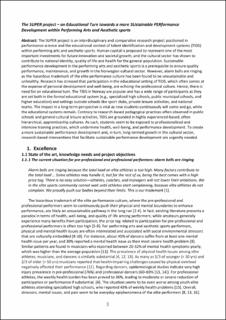NFF application titled: The SUPER project – an Educational Turn towards a more SUstainable PERformance Development within Performing Arts and Aesthetic sports
Working paper
Permanent lenke
https://hdl.handle.net/11250/3070860Utgivelsesdato
2022Metadata
Vis full innførselSamlinger
Sammendrag
Norsk:
SUPER (Sustainable Performance Development) er et tverrfaglig forskningsprosjekt posisjonert innenfor prestasjonsvitenskap med søkelys på konteksten med talentutvikling innenfor estetisk idrett og utøvende kunst. Bærekraftig utøverutdanning er en forutsetning for opprettholdelse av kulturell sektor, som spiller en sentral rolle for samfunnets identitetsbygging og individenes utfoldelse og livskvalitet. Men, forskning har vist at talentutvikling innenfor estetisk idrett og utøvende kunst kan være tildels helseskadelig og lite bærekraftig, og at deltakelse i disse utdanningene kommer med en for høy menneskelig pris. Derfor er det behov for en pedagogisk vending, i tråd med nyere pedagogisk forskning, mot mer studentsentrert og helsefremmende utdanninger. SUPER prosjektet tar sikte på å innovere og teste ut effekt av biopsykososiale titak for å skape en mer bærekraftig talentutvikling i disse utdanningsfeltene.
English:
The SUPER project is an interdisciplinary and comparative research project positioned in performance science and the educational context of talent identification and development systems (TIDS) within performing arts and aesthetic sports. Human capital is proposed to represent one of the most important investments for future innovation and societal growth, and the cultural sector has shown to contribute to national identity, quality of life and health for the general population. Sustainable performance development in the performing arts and aesthetic sports is a prerequisite to ensure quality performance, maintenance, and growth in the Norwegian cultural sector. However, alarm bells are ringing as the hazardous trademark of the elite performance culture has been found to be unsustainable and unhealthy. Research has stressed that participation in the educational setting of TIDS, which often comes at the expense of personal development and well-being, are echoing the professional culture. Hence, there is need for an educational turn. The TIDS in Norway are popular and has a wide range of participants as they are set both in the formal educational system (e.g., specialized high schools, public municipal schools, and higher education) and settings outside schools like sport clubs, private leisure activities, and national teams. The impact in a long-term perspective is vital as new students continuously will come and go, while the educational systems remain. Contrary to research-based pedagogical practices often observed in public schools and general cultural leisure activities, TIDS are grounded in highly experienced-based, often hierarchical, apprenticeship cultures. As such, students seem to be exposed to professionalized and intensive training practices, which undermine health, well-being, and performance development. To create a more sustainable performance development and, in turn, long-termed growth in the cultural sector, research-based interventions that facilitate sustainable performance development are urgently needed.
Beskrivelse
Prosjektsøknad til Norges Forskningsråd
